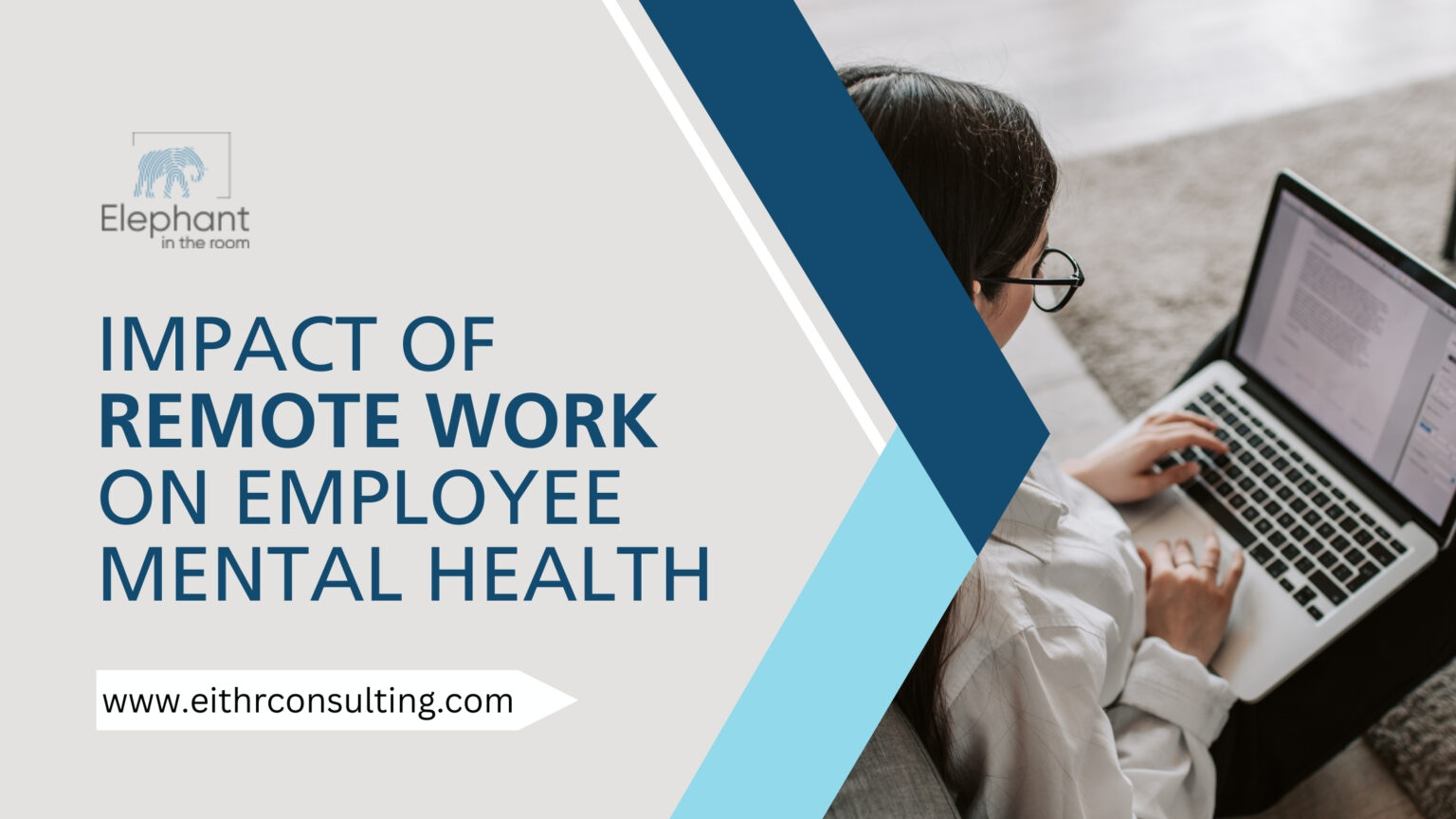The COVID-19 pandemic changed India’s corporate world. It forced millions of employees to transition from traditional office settings to remote work. What started as a temporary solution has now become a near-permanent arrangement across various industries, including IT companies in Bangalore and financial services in Mumbai.
But remote work poses mental health challenges for employees, especially in India. Understanding these challenges and implementing effective solutions is key to sustaining productivity and employee engagement, especially for HR leaders, HR managers, and CEOs striving to create a resilient workforce in the long run.
Why Remote Work is More Than a Trend
Companies that treat remote work as a strategic model rather than a short-term experiment are better positioned for growth since it offers both employees and businesses undeniable advantages.
Key reasons:
- Cost savings: Reduced operational costs, office infrastructure, and overhead costs for companies.
- Talent access: Companies can hire talent from across India without relocation constraints.
- Flexibility: Employees get the freedom to crate personalized workspaces and work from a place of comfort.
- Work-life balance: Employees gain control over their schedules, which can improve satisfaction.
- Technology readiness: Widespread adoption of video conferencing and collaboration tools.
The convenience of working from home has become especially attractive in a country where urban traffic congestion and lengthy commutes have always been sources of daily stress.
The Psychological Impact of Remote Work
Remote work seems promising, but it has exposed employees to unique psychological challenges, especially in Indian companies:
- Isolation and loneliness: Lack of daily social interactions can lead to feelings of disconnection.
- Burnout: Blurred boundaries between work and home can increase stress.
- Anxiety and depression: Constant digital communication and pressure to perform remotely contribute to mental strain.
- Decision fatigue: Remote employees often make more small, repeated decisions, leading to cognitive overload.
👉 PRO TIP: Regular breaks, virtual social interactions, and clear boundaries can reduce psychological strain.
Common Mental Health Challenges in Remote Work
1. Isolation and Loneliness
Remote work can, at times, be lonely. Without the camaraderie and person-to-person interactions employees experience day in and day out in the office, it can be difficult to navigate feelings of belonging. It becomes particularly difficult in India where work relationships and teamwork are the flavor of the day. Multiple employees are disconnected and unsupported which hurts their well-being and productivity.
2. Struggling to Balance Work and Personal Life
Perhaps of the greatest test far off workers face is offsetting their expert obligations with individual obligations. Without the actual partition of an office, many wind up working longer hours. This issue is particularly pervasive in shared spaces, where day to day life and work life might cover, creating extra pressure.
3. Increased Workload and Expectations
Remote work frequently prompts obscured limits, with numerous representatives feeling the strain to be continually accessible. This “consistently on” attitude can make pressure, particularly when correspondence about objectives and cutoff times is hazy. Over the long haul, the additional responsibility and assumption for nonstop accessibility can prompt mental weariness.
4. Digital Fatigue
One more critical issue in remote work is advanced weariness. Spending extended periods of time in virtual gatherings and on screens over the course of the day can prompt actual distress, eye strain, and mental sluggishness. After some time, this screen-time weariness can add to pressure and burnout, particularly in conditions where advanced gadgets are the essential technique for correspondence.
5. Limited Access to Mental Health Resources
In a customary office arrangement, representatives frequently have direct admittance to HR support, wellbeing rooms, and other psychological well-being assets. In any case, working remotely may restrict admittance to these assets, leaving representatives without the help they need while managing pressure or uneasiness.
6. India-Specific Challenges
India’s unique cultural and infrastructural factors add layers of complexity to remote work, including:
- Connectivity issues: Unstable internet in rural or tier-2 cities disrupts productivity.
- Home office limitations: Many employees lack a dedicated workspace, leading to distractions.
- Cultural expectations: Long work hours and hierarchical organizational culture make “logging off” difficult.
- Family obligations: Employees often balance work with household responsibilities, increasing stress.
How Employee Wellbeing Affects Company Health
The psychological prosperity of representatives straightforwardly affects generally speaking efficiency. Poor emotional wellness is frequently connected to expanded truancy, separation, and higher turnover rates, which can all be expensive for organizations. Tending to these difficulties expeditiously helps representatives as well as adds to a positive working environment culture that upholds long haul achievement.
Steps for Indian Companies to Support Employee Mental Health
1. Fostering Mental Health Awareness
To promote Mental Health Awareness for Employees, Indian organizations should focus on creating a culture of psychological well-being awareness. By providing educational resources and facilitating open discussions around mental wellness, companies can help reduce stigma and encourage workers to seek help when needed. This proactive approach to mental health awareness ensures that employees feel supported and understood in their workplace.
2. Conducting Workshops on Stress Management
Regular Stress Management Workshops should be implemented as a core component of employee support programs. These workshops provide employees with practical tools and coping strategies, covering essential topics such as mindfulness practices, time management, and resilience-building techniques. When employees participate in these structured workshops, they become better equipped to handle daily challenges, particularly in remote work environments.
3. Establishing Support Systems
Comprehensive Employee Mental Health Support should be established through creating psychological wellness support networks, including counseling services and peer groups, providing employees with a safe space to address mental health concerns. Flexible arrangements, such as allowing mental health days, demonstrate the company’s commitment to supporting employee well-being and maintaining a healthy work environment.
4. Promoting a Balanced Work-Life Approach
A solid balance between serious and fun activities is critical to remote work achievement. Organizations can help by setting clear working hours, empowering standard breaks, and cultivating a culture that values downtime. Directors can set a model by enjoying their own reprieves and advancing solid limits.
5. Encouraging Social Connections and Team Building
Just because teams are working remotely doesn’t mean social interaction has to disappear. Virtual team-building activities, regular check-ins, and casual video chats can keep employees connected, building a sense of community that reduces feelings of isolation.
Looking Forward: Supporting Remote Work and Mental Health in India
Remote work is becoming a mainstay in India, making it essential for companies to adapt by supporting employees’ mental health. Those companies that invest in mental health resources and support for remote employees are not only promoting well-being but also laying the foundation for a resilient and productive workforce.
The growth of remote work has brought both benefits and mental health challenges to India’s workforce. Addressing issues like isolation, work-life balance, and digital fatigue can help companies build a healthier, more productive workforce. For Indian companies, supporting mental health in remote work environments isn’t just about helping employees—it’s a smart investment in long-term success and organizational well-being.
Frequently Asked Questions
What is remote work?
Remote work is a flexible arrangement where employees perform their job outside a traditional office, using digital tools to collaborate. It supports productivity, work-life balance, and access to talent globally.
Does a remote job mean work from home?
Not always. Work from home (WFH) is a type of remote work, but remote work also includes co-working spaces, cafes, or traveling, anywhere outside a traditional office.
Why do employees want to work remotely?
Employees seek remote work for flexibility, better work-life balance, reduced commute, and increased productivity. Studies published in Tech Talent Outlook show 82% of employees prefer working remotely post pandemic, while 64% admit to being more productive and less stressed with WFH set-up.





